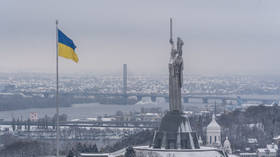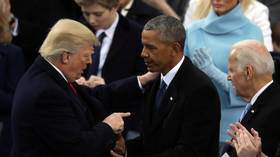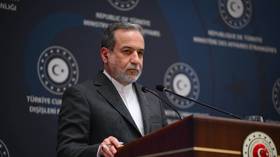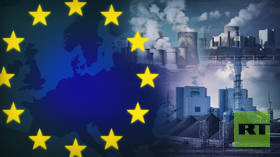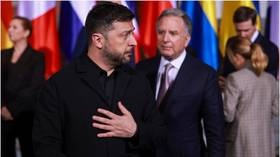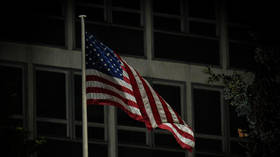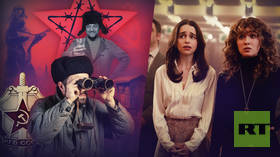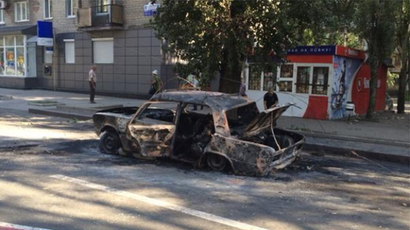Bias and death threats on E.Ukraine frontline
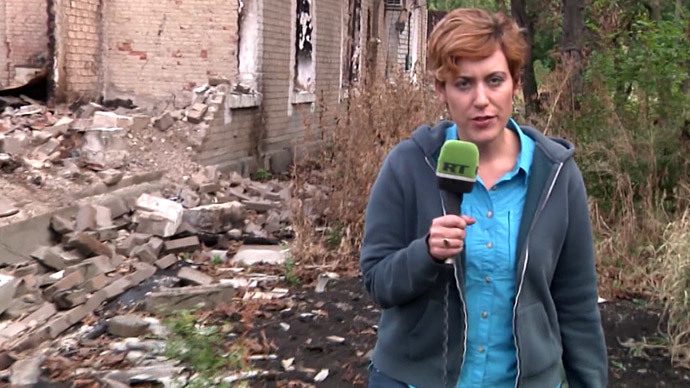
RT correspondent Paula Slier was invited to speak at an OSCE conference about her experience while covering the Ukrainian crisis. But during a panel on freedom of journalism she faced strong anti-Russian-bias similar to what she encounters online.
Below are her impressions:
Towards the end of September, I was invited to speak at an OSCE conference in Warsaw, Poland. I was hoping to have an open and frank discussion supported by facts and experiences I'd gained from weeks of reporting in eastern Ukraine. I expected objectivity and constructive dialogue. What I faced instead was a barrage of insults, eye rolling, mockery and countless baseless accusations. Sadly, there was not much room for a proper conversation as most delegates had a priori labeled RT as a ‘propaganda channel’ and subsequently dismissed anyone with a diverging opinion.
Easily the most unpleasant aspect was the lack of willingness to even acknowledge my side of the story, choosing instead to resort to a form of ad hominem attacks reminiscent of the type I encounter on social media on a regular basis. While the wording carefully evades the blatant insults and vulgar nature of the online comments, the arguments and message are in essence the same. In today’s times, it is not only acceptable, but expected, to confront any opposing view which does not demonize and entirely condemn the Russian perspective. The panelists and participants made that clear when implying the only way for RT journalists to ‘redeem’ themselves is to bow their heads in disgrace and resign, as one person said: “RT journalists are resigning and I don’t blame people for not wanting to talk to a propaganda channel.”
Indeed, two of my fellow correspondents have resigned – and yet, there are countless others, myself included, who work for the channel and are proud to do so.
Some pictures from my #OSCE conference. pic.twitter.com/kAA4chnK42
— PaulaSlier_RT (@PaulaSlier_RT) September 28, 2014
What is propaganda anyway? Who gets to decide what is acceptable to report and what is not? Since when has journalism departed from its true roots and merged into this propaganda machine that only exists to serve wider political forces? Since when is there even an ‘orthodoxy’ or predetermined norm in journalism? It seems, with regards to this issue, it is not about facts anymore, or about communicating information to the wider world.
Just in case my answers weren't clear there, I am ready to repeat them here. I do sleep well at night, given the fact that I am committed to bringing my viewers the most accurate information based on facts. I travel to the most remote and dangerous places, take care to double check information and am always looking for reliable sources. Knowing I am able to give a voice to the silenced victims is enough to make me get off my knees and reject the shameful status the Western media forcefully tries to impose on me and all my fellow RT correspondents.
As I explained at the OSCE conference, Russian reporters are not given entrance to Ukraine and are not permitted to cross Ukrainian-controlled checkpoints. We have been constantly refused ATO permits, which means any attempt to film the Ukrainian military is not only life-threatening, but downright impossible. The indiscriminate shelling of the Ukrainian army has devastated some 60 percent of the region, forcing thousands of people to flee their homes, not to mention the more than 2000 civilians that have been killed or wounded by the Ukrainian army. They are the true victims of this civil conflict, but Kiev refuses to give them a voice. They are dehumanized to the level of collateral damage – the nameless and faceless victims who are not even acknowledged by their own country.
When I was in east Ukraine, many locals avoided talking to me, not because of ideological concerns, but because they have been intimidated, threatened and ordered by Kiev forces not to do so. This is not just a matter of reputation however, but a life-or-death issue, as RT journalists are singled out and targeted by the Ukrainian army, along with anyone else seen in their presence.
When I arrived in Donetsk, I was instructed not to wear a bullet proof vest with the word ‘PRESS’ imprinted on it. One would not expect this in the middle of a war zone, but such vests usually do more to endanger our lives than protect them, signifying us as mere target practice for Ukrainian soldiers.
However, I did not only face the threat of physical attacks, but also psychological ones. The pro-Ukrainian social media trolls seem to have made it a clear objective to break my spirit while I was on the battlefield, with bullets flying over my head and explosions taking place in the background. My Facebook and Twitter feeds were flooded at one point with such messages:

While disagreeing with me on everything and even accusing me of fabricating reports (despite me even uploading pictures from the frontlines as evidence and let's remember I was the one who was there, not them), my ‘critics’ (in the lack of a non-euphemistic term), continued to reply to all my posts and send me such messages every other minute. Regardless of my South African background, for them, anyone who does not condemn Russia as the ‘root of all evil’ is a Russian. Funny how this term is used in today’s world similarly to another word used in 1930s Germany to scapegoat everything on an entire group of people…
As for the ‘smiling’ accusations, I have explained myself - though it should have been obvious by all reasonable means - that I was actually wincing in the photos and footage taken next to the grad missile launcher. Perhaps the Ukrainian grad missile launcher sounds like the Ode to Joy when fired continuously, but I can confirm that was not the case for the one used by the self-defense troops…
My sympathies to mature individuals who cannot distinguish a smile from a wince. They must have had a sad childhood. pic.twitter.com/eNF7N4yzx0
— PaulaSlier_RT (@PaulaSlier_RT) September 7, 2014
See the difference? That's not a smile.
Even so, I heard the same accusations at the OSCE conference. It is indeed troubling that such extreme anti-Russian bias can no longer be found just in the shadiest corners of the deep web, but is instead sugarcoated and thrown around even at such mainstream meetings, which are supposed to adhere and respect the basic rules of ethical journalism.
Watch Paula Slier's reports from eastern Ukraine:



